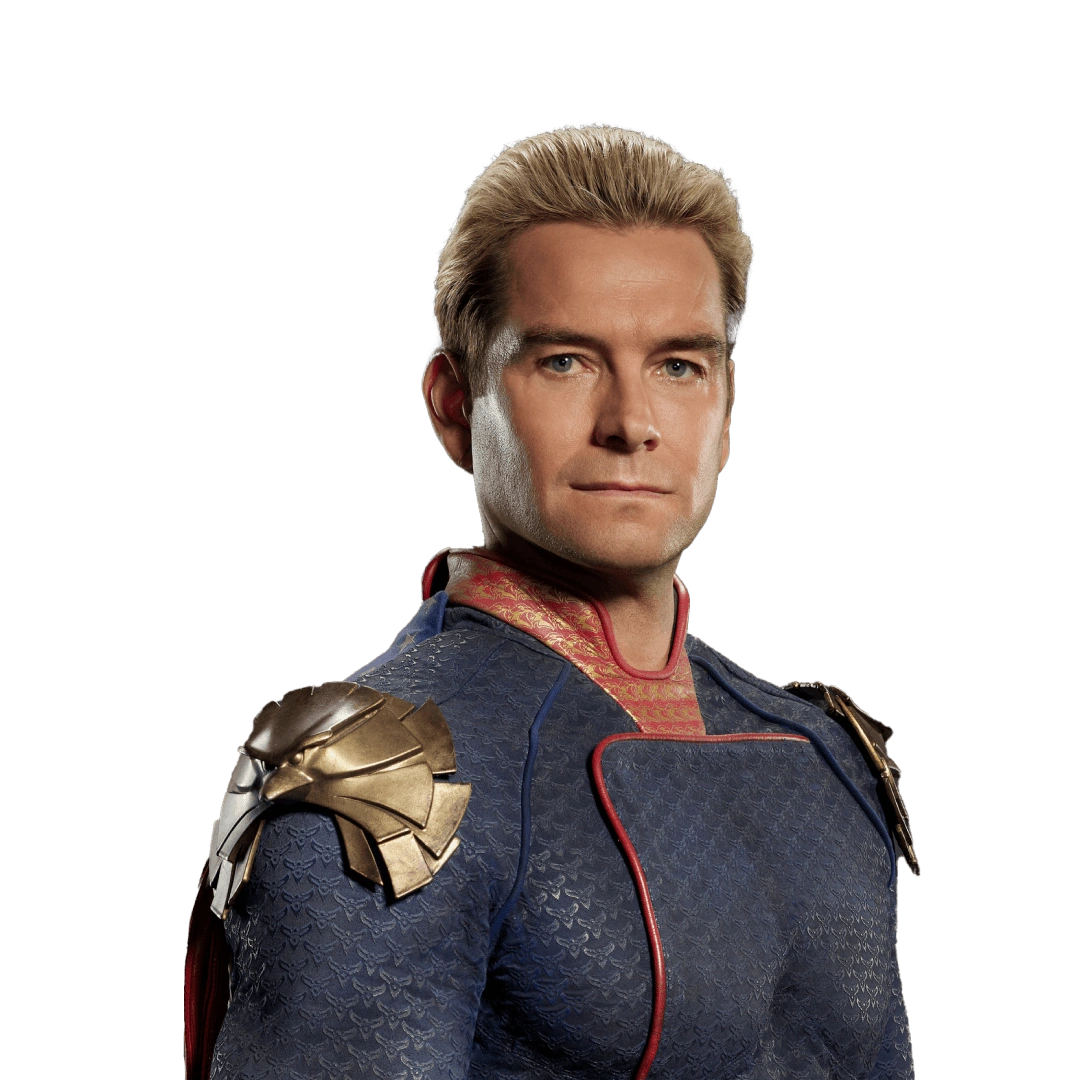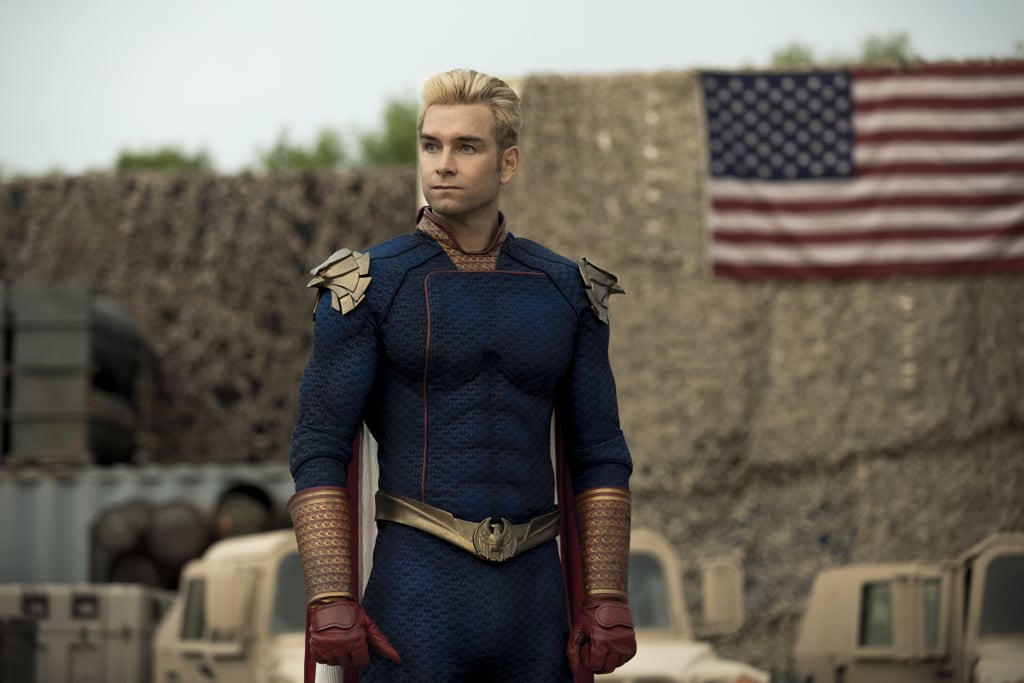The Boys: Homelander's Aging - Powers, Genetics, And Fan Theories!
Is Homelander, the seemingly invincible leader of The Seven, truly ageless? The unsettling truth about his prolonged youth throws the entire superhero narrative into disarray, compelling us to dissect the very essence of his existence. In the wildly popular series, The Boys, Homelander stands as a chilling embodiment of unchecked power, a figure whose godlike abilities are only surpassed by his moral bankruptcy. But beyond the heat vision and the unsettling smile, lies a biological enigma: why does he age the way he does? Here, we'll dissect the perplexing question of Homelander's aging, venturing into the science of accelerated or decelerated senescence, exploring his origins, and examining the profound implications of his prolonged youth on the overarching storyline.
Since the debut of The Boys, viewers have been captivated, and equally disturbed, by the character of Homelander. His strength, speed, and seemingly endless arsenal of superpowers make him an almost mythical figure, yet it is the question of his aging that truly sets him apart. Does he age like any other human being, bound by the same biological constraints, or is there something almost preternatural at work? What implications does Homelander's unique aging process have on his psyche and on the narrative fabric of the series? This article will offer a comprehensive look into this subject, weaving together scientific theories, character analysis, and narrative exploration, to understand what makes Homelander such a compelling and terrifying character.
| Personal and Professional Information | |
|---|---|
| Name | Homelander |
| Real Name | Unknown (Potentially John) |
| Occupation | Superhero, Leader of The Seven |
| Affiliation | Vought International |
| Portrayed By | Antony Starr |
| First Appearance | Season 1, Episode 1 |
| Powers and Abilities | Superhuman strength, speed, flight, heat vision, enhanced senses, near invulnerability |
| Weaknesses | Compound V Dependency (theoretically), psychological instability, potential vulnerability to other supes with comparable power levels. |
| Reference | Homelander Wiki Page |
One of the most pervasive, and unsettling, aspects of Homelander is his aging. While the exact nature of his biological processes remains shrouded in mystery, it is clear that his aging deviates significantly from that of typical humans. This raises critical questions about the origins of his powers and their interplay with his physiology. Is his extended youth merely a byproduct of Compound V, the substance responsible for imbuing him with his abilities? Or is there a more fundamental alteration to his genetic makeup that defies conventional scientific understanding? These questions are at the heart of understanding not only Homelander, but also the unsettling implications of a world where power and morality exist in such a precarious balance.
- Unlock Your Potential Libra Birthstones Their Power
- Then And Now Michael Jacksons Rare Photos Fan Club Today
The key to unraveling the enigma of Homelander's aging may lie in understanding the array of superhuman powers that define his existence. These powers are not merely superficial enhancements; they likely represent profound alterations to his cellular structure, metabolic processes, and overall physiology. Here's a deeper look at each of these extraordinary capabilities:
- Super Strength: Homelander's strength far surpasses that of any human being. This level of strength suggests an incredibly efficient muscular and skeletal system, one that could withstand forces that would shatter ordinary bones. This heightened physical integrity could contribute to a slower rate of physical decay.
- Flight: The ability to defy gravity is arguably Homelander's most iconic power. The mechanisms behind his flight are unknown, but one can speculate that they involve a manipulation of gravitational fields or the generation of immense propulsive forces. Either way, the energy expenditure required for sustained flight could have unexpected consequences on his metabolism and aging process.
- Heat Vision: The searing beams that emanate from Homelander's eyes are a terrifying demonstration of his destructive potential. The generation of such intense heat energy would necessitate a biological system capable of dissipating that energy without causing harm to his own body. This could involve specialized cells or unique circulatory mechanisms that also have a positive impact on aging.
- Enhanced Durability: Homelander's resilience to injury is almost legendary. Bullets bounce harmlessly off his skin, and he can withstand explosions that would obliterate ordinary humans. This level of durability could be attributed to a reinforced cellular structure, enhanced healing capabilities, or a combination of both, which can slowdown the aging process.
Each of these powers suggests fundamental differences in Homelander's biology, providing clues as to why he ages differently, and potentially slower than a typical human.
The science of human aging is an intricate and multifaceted field, involving a complex interplay of genetic, environmental, and lifestyle factors. Understanding these factors in the context of The Boys is crucial to deciphering the puzzle of Homelander's prolonged youth. The genetic blueprint that dictates our lifespan is not a rigid, immutable code. It is susceptible to a myriad of influences, from the quality of our diet to the air we breathe. In the case of Homelander, his genetic makeup likely holds the key to his longevity, but it is a key that has been tampered with, modified, and potentially rewritten by the intervention of Vought International.
- Zach Edey Net Worth 2024 Salary Endorsements Future Projections
- Ty Doran Age Family Career The Untold Story
At the core of the aging process lies the intricate dance of telomeres, the protective caps at the ends of our chromosomes. With each cell division, these telomeres gradually shorten, until they reach a critical length, triggering cellular senescence the cessation of cell division and eventual cellular death. This process is a major driver of aging, contributing to the decline in organ function and the increased susceptibility to age-related diseases. If Homelander possesses a genetic anomaly that prevents or slows the shortening of his telomeres, this could explain his protracted youth. This could involve an enhanced production of telomerase, the enzyme responsible for maintaining telomere length, or a more fundamental alteration to the structure and stability of his telomeres.
Homelander's superpowers force us to confront the question of how extraordinary abilities might alter fundamental biological processes, including aging. These are some theoretical effects:
- Accelerated Cellular Regeneration: The ability to heal from injuries at an extraordinary rate would require a highly efficient cellular regeneration process. If Homelander's powers stimulate this process even in the absence of injury, it could lead to a continuous rejuvenation of his tissues and organs, effectively slowing the aging process.
- Enhanced DNA Repair: Damage to DNA is a major contributor to aging. If Homelander's powers include a mechanism for rapidly and efficiently repairing DNA damage, this could protect him from the cumulative effects of cellular aging.
- Reduced Oxidative Stress: Oxidative stress, caused by the accumulation of free radicals, is a major driver of cellular damage and aging. If Homelander's powers include the ability to neutralize free radicals or enhance his body's antioxidant defenses, this could significantly reduce the rate of aging.
The aging process of Homelander is not merely a biological curiosity; it is a central element in the narrative tapestry of The Boys. His protracted youth has profound implications for his character, his motivations, and his role in the series. As Homelander grapples with his own identity, his perception of time, and his relationship with the world around him, the question of his aging becomes a lens through which we can examine the very nature of power and vulnerability.
- The Burden of Immortality: The prospect of an extended lifespan can be both a blessing and a curse. For Homelander, it may amplify his feelings of isolation and detachment from humanity. As he watches the world around him change and people he knows grow old and die, he may struggle to find meaning and purpose in his own existence.
- The Fear of Decline: While Homelander's aging may be slower than that of ordinary humans, it is unlikely to be nonexistent. The fear of losing his powers, of becoming weak and vulnerable, may drive him to increasingly desperate measures to maintain his position of dominance.
- Legacy and Succession: The question of who will succeed Homelander as the leader of The Seven becomes even more pressing in light of his extended lifespan. Will he seek to create a successor through genetic manipulation or artificial means? Or will he cling to power indefinitely, even as his abilities begin to wane?
To fully appreciate the significance of Homelander's aging, it is helpful to compare him to other characters within The Boys. This comparative analysis highlights the unique challenges and opportunities presented by his prolonged lifespan.
- Butcher: As a mortal man driven by vengeance, Butcher represents the antithesis of Homelander. His aging is a constant reminder of his own mortality, fueling his determination to bring down the seemingly invincible superhero.
- Queen Maeve: Maeve, another member of The Seven, experiences the moral compromises that come with power, but without the same distorted perspective of Homelander. Her aging is likely slowed, but she understands the consequences of choices in a way Homelander seems incapable.
- Starlight: Her youthful idealism clashes directly with Homelander's cynicism and moral decay, and her experience will be vital to understand Homelander's future actions.
The mysteries surrounding Homelander's aging have fueled a multitude of fan theories, each attempting to explain the phenomenon through a unique lens. These theories are a testament to the character's enduring appeal and the imaginative power of the fan community.
- Vought's Experimentation: The most prevalent theory suggests that Vought International has actively manipulated Homelander's genetic makeup to extend his lifespan. This could involve gene therapy, hormonal treatments, or other advanced technologies designed to slow the aging process.
- The Compound V Effect: Some fans speculate that Compound V, the substance responsible for Homelander's powers, has an unintended side effect of slowing down aging. This could be due to the compound's ability to stimulate cellular regeneration or enhance DNA repair mechanisms.
- Psychological Resilience: A more speculative theory suggests that Homelander's mental state plays a role in his aging. His narcissism, detachment from reality, and lack of emotional connections may somehow protect him from the stressors that typically accelerate aging in humans.



Detail Author:
- Name : Amara Lubowitz DVM
- Username : oconnell.boyd
- Email : leon.langworth@yahoo.com
- Birthdate : 1978-11-02
- Address : 1726 Hudson Green Kulasside, UT 95329-1675
- Phone : +1.626.937.3326
- Company : Kozey, Borer and Grant
- Job : Logging Tractor Operator
- Bio : Fugiat dolore dignissimos pariatur fugiat voluptas quaerat. Blanditiis nisi et quia pariatur ipsam ut nemo tempore. Animi a provident ipsum voluptatibus. Ea eius itaque consequatur necessitatibus.
Socials
facebook:
- url : https://facebook.com/jerrold_murazik
- username : jerrold_murazik
- bio : Aut voluptatem rerum omnis adipisci tempora unde deleniti.
- followers : 3902
- following : 2431
linkedin:
- url : https://linkedin.com/in/murazik1985
- username : murazik1985
- bio : Mollitia eum accusantium maiores rerum et.
- followers : 3237
- following : 202
tiktok:
- url : https://tiktok.com/@jerroldmurazik
- username : jerroldmurazik
- bio : Rerum recusandae soluta natus temporibus quaerat.
- followers : 4981
- following : 2765
instagram:
- url : https://instagram.com/jerrold9355
- username : jerrold9355
- bio : Ab exercitationem aut vitae. Quo at nihil voluptas rerum non. Totam cum quis odio quos eos dolorum.
- followers : 4890
- following : 1953
twitter:
- url : https://twitter.com/murazik2003
- username : murazik2003
- bio : Dolore cupiditate qui enim dolores non quo odit qui. Quo facilis recusandae architecto quia omnis. Qui a facere cumque ut. Nobis laborum nam eos nesciunt.
- followers : 1032
- following : 2052